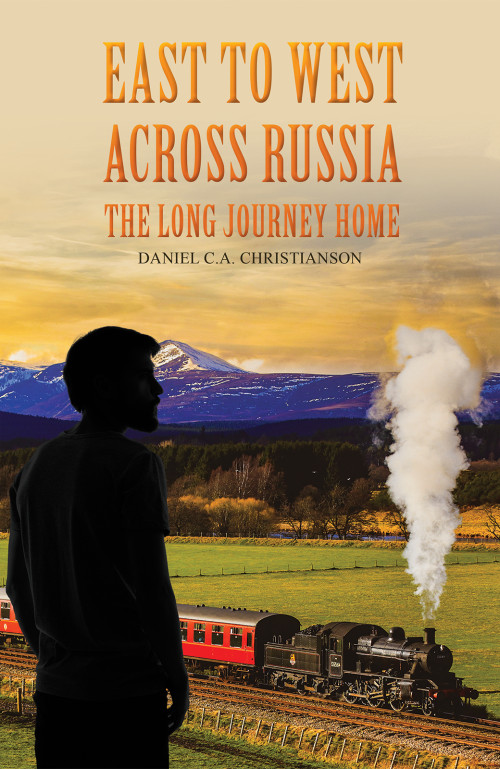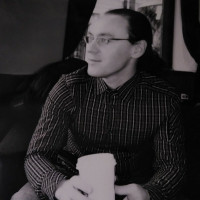
East to West across Russia: The Long Journey Home
Book Format: Choose an option
Free standard delivery on UK orders over £35
*Available directly from our distributors, click the Available On tab below

Book Format: Choose an option
Free standard delivery on UK orders over £35
*Available directly from our distributors, click the Available On tab below

He is a man of solitude. His world is that of the quiet and distilled. Each night, he sits at his desk as the clock strikes midnight. He journeys inward to that bottomless pit of conflict, prompted by memory, in search of an image fused with the imagination in order to reveal truth through character and the creative narrative process. The words become sentences and they are formed. And so it all begins. This was his first attempt and successful completion of a full-length book. His name is Daniel C.A. Christianson.
I was told about this book back home in Germany last year. I had figured with Russia in the title that it was going to be a book filled with propaganda or heavily influenced with conflict and war. The very opposite was the case. It is a delightful memoir written by a love struck, lonely and deeply introspective man who we only know as D and who crosses Russia slowly while pining for his lost love N. I cannot figure out if this mysterious woman named N is a real life person or simply a hallucinatory and disturbed memory that D cannot let go of from his life. N plagues D wherever he goes in Russia and especially so along the distilled waters of Lake Baikal. He longs for her return and whilst she does make an appearance in the final scene I tend to believe just like others have postulated that such a vision of N by D only resides within his own melancholic and imaginary thoughts and that N simply represents an ideal that we all long for but few of us can ever reach. I would like to see this book in translation and especially so in my native German. I am very curious as to how it will read in the German dialect.
I have a love and an appreciation for the epistolary form of writing that has almost faded away in the early 21st century. Daniel C.A. Christianson's use of the epistolary form in his book East to West across Russia: The Long Journey Home suggests a deep appreciation for this mode of storytelling. Letters allow for a personal and direct connection to the reader much like the note addressed to "Dear Reader" in the book found by Emilia. The importance of the letter scene in Omsk next to the statue of the lovers and the note to "Dear Reader" indicate Christianson's interest in using letters to convey emotional depth and to connect with readers. I don't know if the letter written by D and addressed to "Dear N" is a real epistolary letter or one of fiction. I have not made up my mind on this yet. The romantic person in me wants this to be real but the reality is probably more aligned to the everyday and mundane realities of life. Christianson wants to keep alive this dying art form but it has faded away just like N faded away on the heated cobblestones of Red Square as the sun was setting on his journey across Russia. What a beautifully thought out and executed story if at times it was also bizarre.
I finished reading this book recently and came here to see what the reviews are like. The majority of the reviews question whether the character N is a real or fictional person. I cannot add anything to this debate as I am unsure if N is a real life person or simply a symbolic representation of idealised. Perhaps the truth lies somewhere in between. What has become fascinating for me is how copies of Christianson's book is turning up at various locations in Europe and more specifically at European literary sights like Weimar and the grave of James Joyce in Zurich. According to Christianson the copy of his book was left on a bench in Weimar as a gift to whoever might find it. Christianson wrote a note addressed to the reader expressing his desire to share his book and words with someone in Weimar. I think finding the book on a bench evokes a sense of serendipity in which it connects the finder with the author's words and thoughts in an unexpected way. I think Christianson deliberately chose Weimar to place the copy of his words as it is a city with a rich and cultural history and Christianson in placing his words at Weimar cemetery is honouring the lives of Goethe and Schiller who are buried there close to that bench. Both Goethe and Schiller are icons of Weimar's cultural heritage. I think that Christianson in leaving his book in such a location could imply a desire to connect with others who appreciate literature, spirituality and cultural history. I was not one of those lucky people who found this book resting on a bench or on the grave of James Joyce but I am so happy that I have found this book as I really enjoyed it.
I found this quite a bleak but at the same time quite an inspiring story. The protagonist D seems to have reached a crossroads in his life and seems to be tired of the modern world and its excesses. He decides to go to the largest country in the world and delve specifically in the remote and natural beauty of siberia where his metamorphosis begins. I don't think he is pining for a lost love. There is nothing tangible about the character N. She only exists in the mind and memories of D. Instead, he longs for a new way of living and that centres around a life of morality and love for one's fellow human beings along with an inner attachment to the soul within nature. D knows that his time is finite and that he must return to the real world but he can do so in the knowledge that he has chosen to dedicate his life to art and that of a writer. N is symbolic of his old life but he must leave that old life behind to become a man of words.
I want to join the debate of many other reviewers in discussing the mysterious N from Christianson's novel. I don't see her as a real life person either. If she was real then it does not make sense not to give her a voice. I thought at first N is symbolic of lost love but I changed my mind after the final scene when N fades away from D's existence. I feel N is connected to the sublime vastness and utter beauty from the natural world. N is not something tangible that we can feel in this world. Instead, she is something beyond our reach but when we retreat into nature we are connected to such rare beauty and therein we get to experience whom D simply refers to as N or his great love. Christianson's character D is going through an existential crisis and an inner turmoil particularly at Lake Baikal. It is there that N has her birth and she does not depart from D's life until the sun sets on Red Square in Moscow at journeys end. The essence and energy and complex beauty of N drive's D's introspection helping him navigate from fear to creativity and authenticity. N is not portrayed as a fully fleshed out character but as a symbol of D's emotional state and past relationships. N's influence permeates D's thoughts, emotions and interactions with the Russian landscape. It is a marvelous way of telling a modern love story by connecting it to loss of love. I enjoyed it very much.
I read that other reviewers have mentioned that N is a female figure or simply symbolic of something beautiful and precious but I have read her character as a male figure and that the character D loves this male N but he can never speak his name as he cannot allow such love to become a reality in his life. The mystery that runs throughout this novel is that D loves this man named N and it adds a deep layer of complexity to D's story. The novel essentially is a theme of of love, identity and self-discovery that are woven throughout the narrative. D searches for his N throughout the pristine, raw and uncensored beauty of siberia but he can never find him. The vast, wild and natural beauty of the setting seems to mirror the characters' emotional journeys. The harsh yet majestic landscapes of siberia , lake baikal and other locations serve as a backdrop for D's introspection and emotional struggles. The setting also adds to the sense of isolation and solitude that pervades the narrative which could be fitting for a story that explores themes of love, loss and self-discovery. The Russian landscape becomes a character in its own right, shaping the narrative and influencing the characters' experiences
For me, the meaning of this book is the contrast between the natural world and the human being. This is very evident in the scene at lake baikal in siberia where the character D dips his toes in the water of this scared lake it is like a religious experience. Christianson in this scene is showing how the frail and weak human being is when it stands next to the magnificence an timeless splendor of nature. D feels out of place and knows that he truly does not belong next to such a wonder but is compelled to do so as he feels that just maybe he will become a stronger and more rounded being following such an immersion. I really loved this book. It was slow moving at the beginning but once siberia comes into view it takes on a whole new energy.
This book was recommended to me during the summer. I initially thought that it might be a book of propaganda especially with the ongoing war and I also thought that it might be a travelogue but to my surprise this book is neither of those. However, in saying that, I am mot sure how to identify and class this book. Is it fiction? Somewhat maybe. Is it non-fiction? This is difficult to know as there are many layers and unanswered questions to this book. Perhaps it is a modern tale of love loss which to me is at the core of this book. This mysterious lady named only as N is mentioned throughout the narrative but we know so little about her and we never get to hear her speak. I think she is probably a figment of his imagination, the desire love of this character named D which one can surmise is the author Christianson. I liked it very much and I will give it 5* here.
We use cookies on this site to enhance your user experience and for marketing purposes.
By clicking any link on this page you are giving your consent for us to set cookies